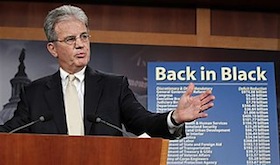Coburn: Save $79 Billion With Nuclear Weapons Cuts
Featured Image
Today's top nuclear policy stories, with excerpts in bullet form.
Stories we're following today: Tuesday, July 19, 2011.
Back in Black: A Deficit Reduction Plan - Sen. Tom Coburn [link]
This week, Senator Coburn (R-OK) released a 614-page plan to reduce $9 trillion from the U.S. national debt over the next ten years. He recommends saving $79 billion and enhancing national security by reducing the U.S. nuclear weapons arsenal. Specifically:
“This option would reduce the size of the nuclear weapon stockpile to levels within the START treaty limits and make the following changes:
- Reduce the size of the Intercontinental Ballistic Missile (ICBM) force from 500 to 300.
- Maintain a 1,100 nuclear weapon reserve.
- Reduce the size of the ballistic nuclear submarine fleet from 14 to 11.
- Maintain 40 strategic bombers and delay the purchase of new bombers until the mid-2020s.”
Holding the Reset Hostage - Alejandro Sueldo in The Moscow Times [link]
- Foreign Minister Sergei Lavrov labeled missile defense as the greatest “irritant” and “key issue” to define U.S.-Russian talks in Washington last week … There is a fundamental disconnect in how Russia and the United States view missile defense and security threats.
- Russia privately recognizes that missile defense as planned does not currently pose a challenge [to Russia] … Much of Russia’s opposition to missile defense is therefore driven by political posturing … While it does not need missile defense nor is threatened by it, Russia uses it to obtain support for its prerogatives in exchange for backing issues pivotal to the West, such as Afghanistan and Libya.
- Much as it does with nuclear disarmament, Russia will spin out talks on missile defense for as long as possible, so as to maximize the benefits this garners, but will never publicly accept it. This is because it cannot be seen as bowing down to the United States, and because the real and perceived credibility of its nuclear deterrent is the key to its seat at the great powers’ table.
- It would be a lost opportunity if Russia did not take part in some missile defense project … [however,] doing so would hamper Russia’s need to and rationale for holding bilateral relations hostage, and help foster greater cooperation on mutual concerns.
Senate Decision Key to Future of Test Ban Treaty - Chris Schneidmiller in Global Security Newswire [link]
- The Obama administration is preparing for a lobbying campaign that could determine the future of the Comprehensive Test Ban Treaty … Before seeking a vote, the administration intends to carry out a program to educate lawmakers and the public on the value of the treaty.
- President Obama might wait to make his push until after publication of a new National Academy of Sciences report on the treaty, said arms control specialist Jeffrey Lewis [director of the East Asia Nonproliferation Program at the James Martin Center for Nonproliferation Studies].
- Still, the Senate’s ratification last year of the U.S.-Russian New START nuclear arms control pact is cause for optimism about the test ban’s chances on Capitol Hill, [executive director of the Arms Control Association Daryl] Kimball said.
India reveals 'world's biggest' uranium discovery - Ben Sheppard in AFP [link]
- A new mine in south India could contain the largest reserves of uranium in the world, a government official said in remarks reported on Tuesday, signalling a major boost for the energy-hungry nation.
- Major exporter Australia has so far rebuffed Indian requests for supplies of the heavy metal, which is refined into nuclear fuel, because the country has not signed the Nuclear Non-Proliferation Treaty.
- India's fast-growing economy is heavily dependent on coal, getting less than three percent of its energy from atomic power. It hopes to raise the figure to 25 percent by 2050 … India currently has 20 nuclear reactors generating 4,780 megawatts of power, plus seven reactors with a capacity of 5,300 megawatts under construction.
Star Wars: Practice Makes Perfect - Mark Thompson in Battleland [link]
- The nation has spent more than $100 billion on missile defense since President Reagan heralded it as the way to render nuclear-tipped missiles "impotent and obsolete" in 1983. But the mission is so complex and challenging, sometimes small elements can slip through the cracks.
- … as the Government Accountability Office reported Monday: “Defending against ballistic missile attacks requires quick responses and an integrating training strategy is important to connect seams where commands, tiers, or elements must work together. However, … the [Department of Defense] runs the risk that personnel may have had limited opportunities to interact across the training tiers and elements under realistic conditions prior to an actual ballistic missile defense engagement.”



